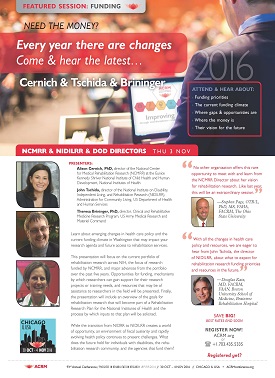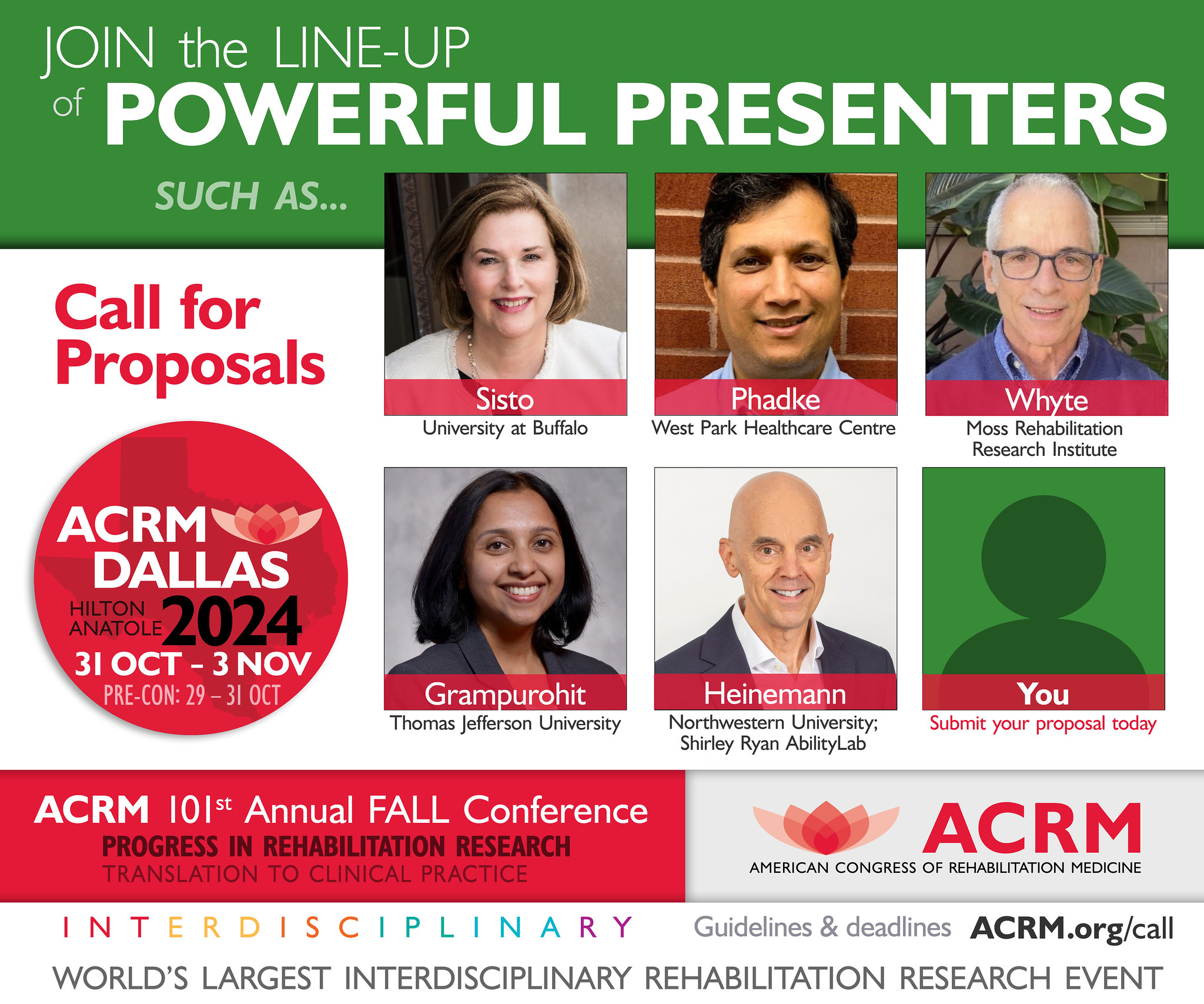NEW: Choose between TWO Featured Sessions
Topics so important, they’re unopposed
RESEARCH FUNDING with NCMRR, NIDILRR, DOD, VA #865
THU 3 NOV // 3:15 PM – 4:30 PM
Every year there are changes in Washington that could affect your research agenda. Come and hear the latest from the directors of the top rehabilitation research funding agencies in the USA.
PRESENTERS:

Alison Cernich, PhD
Director of the National Center for Medical Rehabilitation Research (NCMRR) at the Eunice Kennedy Shriver National Institute of Child Health and Human Development, National Institutes of Health

John Tschida
Director of the National Institute on Disability, Independent Living, and Rehabilitation Research (NIDILRR), Administration for Community Living, US Department of Health and Human Services

Teresa Brininger, PhD, OTR/L, CHT
Director, Clinical and Rehabilitative Medicine Research Program, US Army Medical Research and Materiel Command
Learn about emerging changes in health care policy and the current funding climate in Washington that may impact your research agenda and future access to rehabilitation services.
This presentation will focus on the current portfolio of rehabilitation research across NIH, the focus of research funded by NCMRR, and major advances from the portfolio over the past five years. Opportunities for funding, mechanisms by which researchers can gain support for their research projects or training needs, and resources that may be of assistance to researchers in the field will be presented.
Finally, the presentation will include an overview of the goals for rehabilitation research that will become part of a Rehabilitation Research Plan for the National Institutes of Health and the process by which inputs to that plan will be solicited.
While the transition from NIDRR to NIDILRR creates a world of opportunity, an environment of fiscal austerity and rapidly evolving health policy continues to present challenges. What does the future hold for individuals with disabilities, the rehabilitation research community, and the agencies that fund them?
“No other organization offers this rare opportunity to meet with and learn from the NCMRR Director about her vision for rehabilitation research. Like last year, this will be an extraordinary session.” —Stephen Page, OTR/L, PhD, MS, FAHA, FACRM, The Ohio State University
“With all the changes in health care policy and resources, we are eager to hear from John Tschida, the director of NIDILRR, about what to expect for rehabilitation research funding priorities and resources in the future.” —Douglas Katz, MD, FACRM, FAAN, Boston University School of Medicine, Braintree Rehabilitation Hospital
FITNESS TRAINING & THE BRAIN #863
THU 3 NOV // 3:15 PM – 4:30 PM
This presentation will cover what we currently know, from animal studies, epidemiological studies, and human randomized controlled trials about the relationship between physical activity and exercise and cognitive and brain health across the lifespan. The presentation will also focus on gaps in our knowledge and how we might go about filling these knowledge gaps.

Arthur F. Kramer, PhD
Dr. Kramer is Senior Vice Provost for Research and Graduate Education and a Professor of Psychology & Engineering at Northeastern University. He previously served as the Director of the Beckman Institute for Advanced Science & Technology and the Swanlund Chair and Professor of Psychology and Neuroscience at the University of Illinois. He received his PhD in Cognitive/Experimental Psychology from the University of Illinois in 1984.
Professor Kramer’s research projects include topics in Cognitive Psychology, Cognitive Neuroscience, Aging, and Human Factors. A major focus of his lab’s recent research is the understanding and enhancement of cognitive and neural plasticity across the lifespan. Professor Kramer’s research has been featured in a long list of print, radio and electronic media including the New York Times, Wall Street Journal, Washington Post, Chicago Tribune, CBS Evening News, Today Show, NPR and Saturday Night Live.











